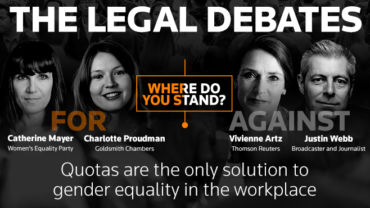
Ahead of Thomson Reuters’ next Legal Debate on 19 September, we are publishing a series of quickfire Q&As with each of the four debating panellists. At the event, Catherine Mayer, Author and Co-Founder of the Women’s Equality Party, will be arguing in favour of the debate’s motion “quotas are the solution to gender equality in the workplace”.
Ahead of the Legal Debate, Mayer tells Legal Insights UK & Ireland about her career journey so far, and her passion for advancing gender equality in the workplace.
Tell us about your role at the Women’s Equality Party, and what inspired you to co-found the party?
I’m the President and sit on the party’s executive and steering committees, but I’m delighted to say that my powers are extremely circumscribed. The party has a fully-fledged internal democracy and in fact I’ve just returned home from our annual conference, which is the primary decision-making forum. Delegates voted in a raft of transformational new policies and elected new representatives for a series of party positions. It was a wonderful few days. I was inspired to co-found the party because mainstream politics routinely marginalises women and women’s perspectives. The many hundreds of women who attended the conference are the living embodiment of all the talent and energy that traditional politics excludes. Quite a few of them spoke for the first time in front of a large audience, and their speeches were more compelling than anything you will have heard in Westminster.
What influences have impacted your career path?
I went into journalism because I believed in it. I left full-time journalism because I recognised the limits of my ability to create change from within. That doesn’t mean I’ve given up on journalism. I still write books and occasional longer pieces, and I’m deeply concerned about the crisis in journalism and how this impacts democracy. I’m just finding more direct ways to address this problem than merely reporting on it.
What do you think are the main challenges in tackling gender inequality within the workplace?
Gender inequality in the workplace begins long before any of us reach the workplace, determined by the structures and expectations we’re born into and the messaging and educations we receive. The gender gap widens as people reach their 30s, when women find themselves suffering a maternity penalty or the assumption that they’ll soon be starting families. There are many effective ways to help combat bias and create more inclusive cultures, not least short-term quotas, but to speed and anchor this change a more fundamental shift is needed. Until we value caregiving, ensure affordable childcare and properly funded shared parental leave, labour markets will always be skewed. Business and political leaders should stop making excuses and put a real priority on this, because only by harnessing the best talents do organisations and economies thrive.
What steps should organisations take to address their gender pay gap?
The pay gap is sometimes an indication of pay discrimination, which is of course illegal, and always of structural barriers. But it is also a sign of organisational failure.
The Legal Debate will take place at 17.30 on 19 September, at The Mermaid, Puddle Dock, London, EC4V 3DB. To register for your free place at the event, click here.

